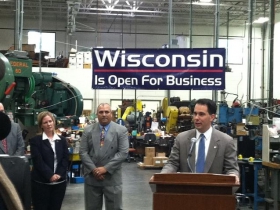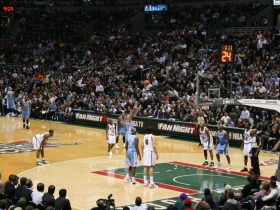Walker Delays On Three Tough Issues
No decision before election on new Bucks arena, proposed Kenosha casino and how to fund new highway construction.
Three major public policy decisions are unlikely to be made before the Nov. 4 election for governor: Whether to allow the Menominee Tribe’s plan for a Kenosha casino. Financing of a downtown Milwaukee arena for the Milwaukee Bucks. And, how to pay for future highway and other transportation programs statewide.
Each is worth considering separately. Republican Gov. Scott Walker recently asked the federal government for a six-month extension, with the clock starting Aug. 23, before he makes an up-or-down decision on the Menominee’s $800-million new casino and entertainment complex. The federal government took several years before it approved the casino, Walker told reporters, so what’s the hurry?
But Walker’s indecision is unusual for a governor who made quick, controversial decisions even before he took office – killing the federal government’s offer to pay for high-speed passenger train service between Milwaukee and Madison, for example. And, he was in office only weeks before picking the Act 10 fight that all but eliminated collective bargaining for public employees, except firefighters and police officers. He also quickly said no – and has never reconsidered – another federal offer to cover the costs of expanding Medicaid health-care coverage for more low-income Wisconsin adults.
But, last year, Walker not only blew by his own deadlines to make a Kenosha casino decision, but he also waffled on what had been his three non-negotiable conditions before it could be built: Local support for it. Unanimous backing from all Wisconsin tribes. And no “net’ increase in gaming.
Why would a governor who has prided himself on making tough decisions keep his finger in the air on the Kenosha casino? Could it be the split in public opinion over that casino? The Jan. 27 Marquette University Law School poll found that 41.9 percent of those responding supported the casino, but 40.7 percent opposed it – results that fell within the poll’s margin of error. Maybe a governor in danger of not being re-elected doesn’t want to anger a huge chunk of voters with whatever Kenosha decision he makes.
A second political land mine that won’t be defused before Nov. 4 is how to pay for a new Milwaukee Bucks arena. The team‘s National Basketball Association contract requires a new venue when its lease expires in 2017. In a WisconsinEye interview last week, Milwaukee Mayor Tom Barrett again said multi-county, regional support is the only fair way to pay for a new arena, since suburban residents follow and support the team.
But, in a separate WisconsinEye interview, Milwaukee’s new Common Council President Michael Murphy said three border counties have passed resolutions saying their residents should not help pay for a new Bucks arena. Some Racine County leaders even want to withdraw from the multi-county taxing district created in the 1990s that raised their sales tax slightly to help build Miller Park for the Brewers. Barrett said that won’t happen, however.
One civic leader in the middle of preliminary talks on how to pay for a new arena, Tim Sheehy of the Metropolitan Milwaukee Association of Commerce, conceded that no funding plan will be made public before Nov. 4 election. There’s no easy financing solution, but nobody – Walker, Barrett, Murphy or Sheehy – wants to be on the list of leaders who failed to help Milwaukee keep the Bucks, despite their worst-in-the-league record.
To avoid raising taxes and avoid construction delays in these and dozens of other transportation projects statewide, the current state budget borrows about $993 million. That’s more than the $880 million that would be raised if the 5 percent state sales tax was raised to 6 percent.
With the election only eight months away, Walker has finessed the transportation funding issue by telling state Transportation Secretary Mark Gottlieb to come up with recommendations by January, when the governor elected in November presents the 2015-17 budget.
You could say there’s been a lack of political leadership – so far – on these three problems. But there’s an upside to the delay: It gives voters a chance to demand that candidates outline their positions on each of them.
Steven Walters is a senior producer for the nonprofit public affairs channel WisconsinEye. Email stevenscwalters@gmail.com
Political Contributions Tracker
Displaying political contributions between people mentioned in this story. Learn more.
- February 3, 2016 - Tom Barrett received $400 from Tim Sheehy
The State of Politics
-
A Wisconsin Political Trivia Quiz
 Dec 15th, 2025 by Steven Walters
Dec 15th, 2025 by Steven Walters
-
The Fight Over Wisconsin’s House Districts
 Dec 8th, 2025 by Steven Walters
Dec 8th, 2025 by Steven Walters
-
The Battle Over On-Line Betting
 Nov 24th, 2025 by Steven Walters
Nov 24th, 2025 by Steven Walters





















As proved by Walker and staff emails, they are always in campaign mode and he is utterly bereft of any real ideas and vision for the future. This con-artist is totally dependent on his corporate laws from the mountain of ALEC. What a disaster and embarrassment for Wisconsin citizens and the rest of the country.
This is a time period in history where we should have the best and brightest working for solutions in policy for the economy, science, energy, education, transportation, trustworthy, honest, and efficient governance, and increasing freedom and rights for all citizens. Instead we have the least educated in modern history, and dim-witted, con-artists, funded by wealth and power to maintain their special interests at the expense of the majority. Wisconsin will pay and suffer for this disaster of corrupt and inept governance for years to come.
It may also be possible that the delay gives the interested parties more time to make campaign donations.